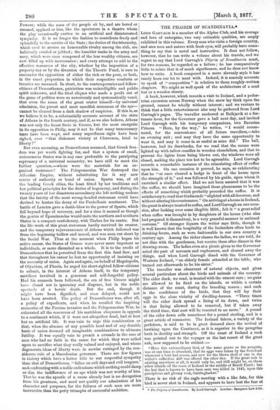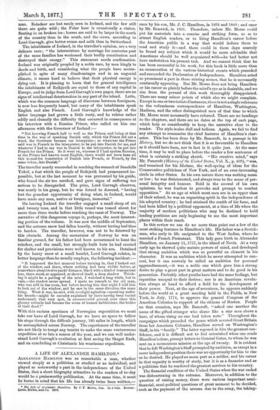THE PILGRIM OF SCANDINAVIA.*
LORD GARVAGH is a member of the Alpine Club, and his courage. and love of enterprise, two very estimable qualities, are amply exhibited in this volume. Every man who visits a foreign country, and sees men and nature with fresh eyes, will probably have some- thing to say that is novel and instructive. It does not follow, however, that he can write a volume about his travels, and we regret to say that Lord Garvagh's Pilgrim of Scandinavia must, for two reasons, be regarded as a failure ; he has comparatively little to relate that is of much significance, and he does not know how to write. A book composed in a more slovenly style it has. rarely been our lot to meet with. Indeed, it is scarcely accurate to speak of " composition " in relation to these roughly-written chapters. We might as well speak of the architecture of a mud, hut or a wooden shanty.
A book, however, which records a visit to Iceland, and a pedes- trian excursion across Norway when the snow lay thick upon the ground, cannot be wholly without interest ; and we venture to think that a little entertainment also may be gathered from Lord Garvagh's pages. The traveller anchored at Reikjavik at a for- tunate hour, for the Governor gave a ball next day, and invited. Lord Garvagh with his temporary companions, two Bavarian- Princes. "Here, by the way," he writes, "I would recom- mend, for the convenience of all future travellers,—take an evening suit; and may they have the same opportunity to wear it, and may it come in as useful as mine did." The ball, however, had its drawbacks, for we read that the rooms were lighted up with tallow-candles in wooden chandeliers, and that to. prevent the lights from being blown out, the windows were all closed, making the place too hot to be agreeable. Lord Garvagh records a remarkable instance of the stimulating effect of coffee upon him. On one occasion it proved, he says, so exhilarating that he "at once cleared a hedge in front of the house upon- the strength of it," and was followed by his guide, upon whom it exercised a similar effect. Had we not been assured that it was the coffee, we should have imagined these phenomena to be the effects of something which probably preceded the coffee. It is satisfactory to read that Gudmundr "alighted with all decorum, and without altering his countenance." On arriving at a house in Iceland, the guest is always treated to coffee, and Lord Garvagh on one occa- sion, after looking over some illegible MSS., felt it " a great relief when coffee was brought in by daughters of the house (who also
- had prepared it themselves), in a very graceful manner in national costume." Of stronger liquors the writer says little, though it is well known that the hospitality of the Icelanders often leads to drinking-bouts, such as were fashionable in our own country a century ago. Among the richer classes the ladies, we are told, do. not dine with the gentlemen, but receive them after dinner in the
The ladies even at a picnic given to the Governor acted the part of servants and cupbearers, and cleared away the things, and when Lord Garvagh dined with the Governor of Western Iceland, "an elderly female attended at the table, who- turned out afterwards to be his sister."
The traveller was observant of natural objects, and gives- several particulars about the birds and animals of the country. The eider duck, we read, is treated with the utmost care ; no guns are allowed to be fired on the islands, or within a certain distance of the coast, during the breeding season ; and such is the confidence of the birds, that they will lay their- eggs in the close vicinity of dwelling-houses. "Three times will the eider duck spread a lining of its down, and twice is that lining allowed to be removed, but if taken away the third time, that nest will be resorted to no more." A pound of the eider down sells sometimes for a pound sterling, and is a great article of commerce. The Iceland falcon, a variety of the gerfalcon, is said to be in great demand since the revival of
hawking upon the Continent, as it is superior to the peregrine both in docility and strength. Off the coast of Iceland a rock was pointed out to the voyager as the last resort of the great auk, now supposed to be extinct :—
"Hero this extraordinary bird, of the same genus as the penguin, was at one time so abundant, that its eggs were taken by the boat-load whenever a boat had access, and now for the blown shell of one in the writer's collection £60 was offered the other day. If the great auk is existing anywhere at all, it would only be, and still might be, on those other islands off the coast of Iceland in the middle of Breidi Fjord ; but the last that is known to have been seen was killed in 1845, upon this precipitous and gloomy rock, Gairfuglasker."
There is no risk of the eagle meeting with a like fate, for this. bird is never shot in Iceland, and appears to have lost the fear of
• The Pilgrim of Scandinavia. By Lord Garvagh. London: Sampson Low & Co.
man. Reindeer are but rarely seen in Iceland, and the few still there are quite wild ; the Polar bear is occasionally a visitor, floating in on broken ice ; horses are said to be larger in the north of the country than in the south, and the -cows, according to Lord Garvagh, give better cream and milk than in Switzerland.
The inhabitants of Iceland, in the traveller's opinion, are a very delicate race ; "the intermixture by marriage for centuries past of the same families has weakened their bodily constitution and destroyed their energy." This statement needs confirmation. Iceland was originally peopled by a noble race, by men kingly in deeds and birth, and considering what the people have accom- plished in spite of many disadvantages and in an ungenial climate, it seems hard to believe that their physical energy is dying out. It is pleasing to learn that for general intelligence the inhabitants of Reikjavik are equal to those of any capital in Europe, and to judge from Lord Garvagh's own pages, there are no signs of intellectual deterioration in any part of the island. Latin, which was the common language of discourse between foreigners, is now less frequently heard, but many of the inhabitants speak English and also French. Lord Garvagh's knowledge of the latter language had grown a little rusty, and he relates rather oddly and clumsily the difficulty that occurred in consequence at his interview with a Russian Prince, who called on him one afternoon with the Governor of Iceland :—
"Not knowing French half so well as the Prince, and being at that time in the way of speaking Danish only, which the Prince did not a word, the Governor became our interpreter ; so whatever the Prince said was in French to the interpreter, to be put into Danish for me' and whatever I had to say was in Danish to the interpreter, to be put into French for the Prince. So it went on whereas if I had spoken Russian, or the Prince had known some English, there would not have been all this to-and-fro translation of Danish into French, or French, by the same token, into Danish."
The traveller nearly succeeded in reaching the summit of Snaefells Yokul, a feat which the people of Reikjavik had pronounced im- possible, but at the last moment he was prevented by his guide, who found the air too rarefied, and gave signs of suffering too serious to be disregarded. The prize, Lord Garvagh observes, was nearly in his grasp, but he was forced to descend, "having lost the grandest opportunity of doing what, in Iceland, would have made any man, native or foreigner, immortal."
On leaving Iceland the traveller engaged a small sloop of six and twenty tons, and in that little vessel was tossed about for more than three weeks before reaching the coast of Norway. The narrative of this dangerous voyage is, perhaps, the most interest- ing portion of the volume, it was now the middle of September, and the autumn snow had fallen heavily, without having had time to harden. The traveller, however, was not to be deterred by this obstacle. Among the mountains of Norway he was on familiar ground, for his father had been accustomed to hunt the reindeer, and the small, but strongly-built huts he had erected for shelter and provisions were well known to his son. Detained by the heavy snow at a small hamlet, Lord Garvagh relates, in better language than he usually employs, the following incident :—
" It happened the last moment before turning in, that I looked out of the window, and there, where nothing had been visible before, at somewhere about twelve yards' distance, black with a kind of transparent hue, there stood, or appeared, or showed itself, a deep shadow Think- ing it might be a parting of the mist, I watched a long while, but in vain,—the shadow never spread. I made no remark to the old man, who was still in the room, but before leaving him that night I told him to look out of the window, and he saw in the same direction the same thing. What it was, he said, with no slight agitation—speaking under his breath—might be secretly explained by there having been buried underneath that very spot, in unconsecrated ground, ever since this gloomy solitude had become the scene of human habitations, the bodies of their dead !"
With this curious specimen of Norwegian superstition we must take our leave of Lord Garvagh, for we have no space to follow his steps through the difficult journey, 185 miles in length, which he accomplished across Norway. The experiences of thetraveller are not likely to tempt any tourist to make the same venturesome expedition at so late a season of the year, and we can well under- stand Lord Garvagh's exultation at first seeing the Skager Rack, and on concluding at Christiania his wearisome expedition.



































 Previous page
Previous page